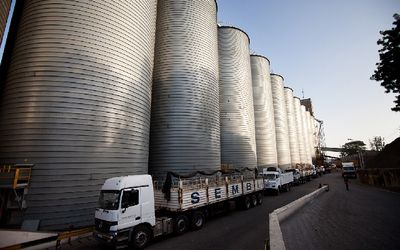DOZENS of trucks wait in line to cross the border from Kenya to Uganda. Hauling tomatoes along East Africa’s northern border, the drivers have lost up to four hours in reduced speed because of poor road conditions along some segments.
But when they approach the border, the delays get longer. It takes on average a full day for them to complete the paperwork required to cross from Kenya into Uganda.
The delay would cause financial losses with any freight, but it is especially troublesome with agricultural goods, where delays could leave much of a truckload unfit for sale at its destination.
This same losing scenario plays out in different ways throughout the world. Guatemalan exporters sending goods overland to Mexico are forced to offload their cargo from Guatemalan trucks at the border and reload it onto Mexican trucks, a regulatory hurdle that contributes to food spoilage and discourages commerce.
In Nigeria, trucks hauling cassava flour are required to carry about 50 different permits costing $75-$150 per truck per year, often making it uneconomical to transport the important food staple to markets where it is desperately needed.
In a world where 12.5% of the population suffers chronic undernourishment, the fact that 30% of food produced for human consumption is lost or wasted between farm and fork is difficult to comprehend.
Along the agricultural supply chain — from post-harvest storage through transportation and distribution — spoilage, spillage and other contributors to food loss remain a serious problem.
Globally, up to 1.3-billion tonnes of food are lost or wasted each year, evidence that hunger is a dramatic consequence of unnecessary trade barriers.
Last July, the World Trade Organisation nations failed to ratify a trade facilitation agreement that would have set the stage for faster and more efficient customs procedures to encourage dramatic changes, not only in the reduction of world hunger but also in fostering environmental sustainability and economic development.
The agreement was designed to encourage effective co-operation between customs and other authorities on trade facilitation and customs compliance issues, providing for technical assistance to help countries build electronic capabilities to speed the flow of goods. It would have opened the door for improving inefficient border administration.
But even in its absence, governments on their own can take some of the recommended steps, addressing the barriers that have hurt the food supply chain and local economies.
Those hurdles include protectionist measures that limit market access, underdeveloped transportation infrastructure and services, and regulatory environments that preclude small to medium-sized businesses.
Research conducted for the World Economic Forum by the World Bank and management consulting firm Bain found that reducing even a restricted set of supply chain barriers halfway to global best practice would yield a nearly 5% increase in gross domestic product.
The public sector is best positioned to reduce these barriers, usually in partnership with private enterprises, with both sectors benefiting from each other’s strengths. Hopeful nations can point to the encouraging advances made.
When Kenya’s government improved the Nairobi-Mombasa road and expanded the Mombasa port’s capacity, it led to much-needed private-sector investment by exporters and transporters.
...
INVESTMENTS in refrigerated containers and covered trucks, along with support for smallholder farms to acquire export certification, helped reduce food loss and enabled Kenya to reach the tipping point at which it became profitable for the country’s enterprises to serve new European markets with its avocados.
Also, by removing fertiliser price controls and subsidies, Kenya spurred competition that lowered fertiliser end prices, triggering a 14% increase in adoption rates among small farmers.
Efforts to modernise border administration have helped Thailand cut the time for border clearance nearly in half — and the country is working to steadily improve.
But South Korea sets the standard for smart borders. When shippers release goods from a warehouse, they enter the necessary information into an electronic system, so that the Korean Customs Service doesn’t need to wait until the shipment arrives at a port or terminal. Imports require only about 90 minutes to clear customs.
South Korea’s customs office also introduced a new automated risk-management system, eliminating much of the need for manually inspecting packages.
When it launched the operation, South Korea wisely encouraged customs agents according to the number of risky items they found in more targeted manual inspections, a move that keeps them motivated and makes it less tempting for them to engage in corrupt practices.
Policy makers can learn from the best practices of countries like South Korea. These and other leaders usually follow a four-step process.
They begin with a preparation phase ensuring all stakeholders agree to the objectives and governance structure. That’s followed by a diagnostic phase in which participants determine the effect trade facilitation will have on key industries.
Next, they embark on a planning exercise to convert their vision into actionable steps. Only then do they execute — with a clear process for measuring and tracking results.
By dedicating themselves to eliminating supply chain barriers, pioneering countries set in motion a virtuous cycle, raising global productivity and tackling the enormous challenge of feeding the undernourished.
• Merkel is a Bain & Company partner based in Johannesburg, and Gottfredson is a Bain partner based in Dallas.

Trucks wait to be loaded with grain in Mombasa, Kenya. Legal delays that are inefficient and avoidable are causing hunger worldwide. Picture: BLOOMBERG
DOZENS of trucks wait in line to cross the border from Kenya to Uganda. Hauling tomatoes along East Africa’s northern border, the drivers have lost up to four hours in reduced speed because of poor road conditions along some segments.
But when they approach the border, the delays get longer. It takes on average a full day for them to complete the paperwork required to cross from Kenya into Uganda.
The delay would cause financial losses with any freight, but it is especially troublesome with agricultural goods, where delays could leave much of a truckload unfit for sale at its destination.
This same losing scenario plays out in different ways throughout the world. Guatemalan exporters sending goods overland to Mexico are forced to offload their cargo from Guatemalan trucks at the border and reload it onto Mexican trucks, a regulatory hurdle that contributes to food spoilage and discourages commerce.
In Nigeria, trucks hauling cassava flour are required to carry about 50 different permits costing $75-$150 per truck per year, often making it uneconomical to transport the important food staple to markets where it is desperately needed.
In a world where 12.5% of the population suffers chronic undernourishment, the fact that 30% of food produced for human consumption is lost or wasted between farm and fork is difficult to comprehend.
Along the agricultural supply chain — from post-harvest storage through transportation and distribution — spoilage, spillage and other contributors to food loss remain a serious problem.
Globally, up to 1.3-billion tonnes of food are lost or wasted each year, evidence that hunger is a dramatic consequence of unnecessary trade barriers.
Last July, the World Trade Organisation nations failed to ratify a trade facilitation agreement that would have set the stage for faster and more efficient customs procedures to encourage dramatic changes, not only in the reduction of world hunger but also in fostering environmental sustainability and economic development.
The agreement was designed to encourage effective co-operation between customs and other authorities on trade facilitation and customs compliance issues, providing for technical assistance to help countries build electronic capabilities to speed the flow of goods. It would have opened the door for improving inefficient border administration.
But even in its absence, governments on their own can take some of the recommended steps, addressing the barriers that have hurt the food supply chain and local economies.
Those hurdles include protectionist measures that limit market access, underdeveloped transportation infrastructure and services, and regulatory environments that preclude small to medium-sized businesses.
Research conducted for the World Economic Forum by the World Bank and management consulting firm Bain found that reducing even a restricted set of supply chain barriers halfway to global best practice would yield a nearly 5% increase in gross domestic product.
The public sector is best positioned to reduce these barriers, usually in partnership with private enterprises, with both sectors benefiting from each other’s strengths. Hopeful nations can point to the encouraging advances made.
When Kenya’s government improved the Nairobi-Mombasa road and expanded the Mombasa port’s capacity, it led to much-needed private-sector investment by exporters and transporters.
...
INVESTMENTS in refrigerated containers and covered trucks, along with support for smallholder farms to acquire export certification, helped reduce food loss and enabled Kenya to reach the tipping point at which it became profitable for the country’s enterprises to serve new European markets with its avocados.
Also, by removing fertiliser price controls and subsidies, Kenya spurred competition that lowered fertiliser end prices, triggering a 14% increase in adoption rates among small farmers.
Efforts to modernise border administration have helped Thailand cut the time for border clearance nearly in half — and the country is working to steadily improve.
But South Korea sets the standard for smart borders. When shippers release goods from a warehouse, they enter the necessary information into an electronic system, so that the Korean Customs Service doesn’t need to wait until the shipment arrives at a port or terminal. Imports require only about 90 minutes to clear customs.
South Korea’s customs office also introduced a new automated risk-management system, eliminating much of the need for manually inspecting packages.
When it launched the operation, South Korea wisely encouraged customs agents according to the number of risky items they found in more targeted manual inspections, a move that keeps them motivated and makes it less tempting for them to engage in corrupt practices.
Policy makers can learn from the best practices of countries like South Korea. These and other leaders usually follow a four-step process.
They begin with a preparation phase ensuring all stakeholders agree to the objectives and governance structure. That’s followed by a diagnostic phase in which participants determine the effect trade facilitation will have on key industries.
Next, they embark on a planning exercise to convert their vision into actionable steps. Only then do they execute — with a clear process for measuring and tracking results.
By dedicating themselves to eliminating supply chain barriers, pioneering countries set in motion a virtuous cycle, raising global productivity and tackling the enormous challenge of feeding the undernourished.
• Merkel is a Bain & Company partner based in Johannesburg, and Gottfredson is a Bain partner based in Dallas.
























Post a comment